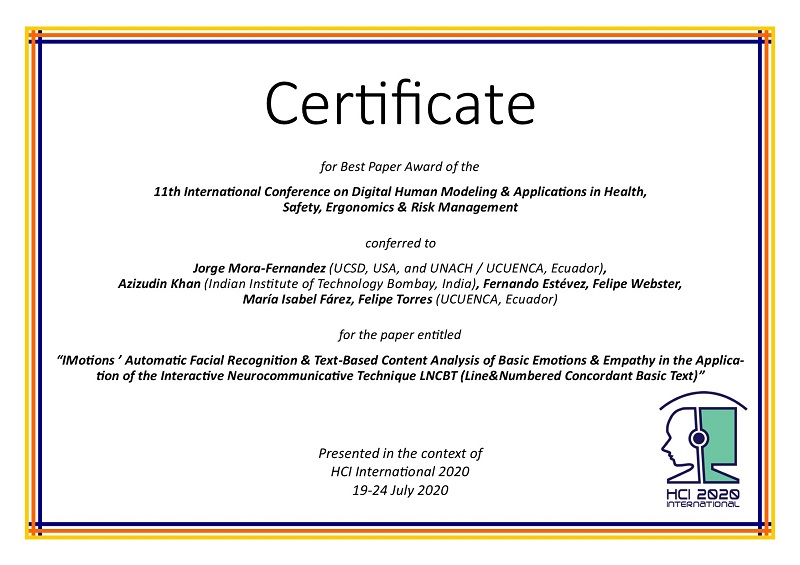
Certificate for Best Paper Award of the 11th International Conference on Digital Human Modeling & Applications in Health, Safety, Ergonomics & Risk Management
The award has been conferred to
Jorge Mora-Fernandez (University of California San Diego, USA, and UNACH / UCUENCA, Ecuador),
Azizudin Khan (Indian Institute of Technology Bombay, India),
Fernando Estévez, Felipe Webster, María Isabel Fárez, Felipe Torres (UCUENCA, Ecuador)

Jorge Mora-Fernandez
(presenter)
for the paper entitled
"IMotions' Automatic Facial Recognition & Text-Based Content Analysis of Basic Emotions & Empathy in the Application of the Interactive Neurocommunicative Technique LNCBT (Line&Numbered Concordant Basic Text)"
Presented in the context of
HCI International 2020
19-24 July 2020
Paper Abstract
"This research paper focuses on the effectiveness of the Line Numbered Concordant Basic Text (LNCBT) of Narcotics Anonymous as an interactive neurocommunicative and gamificated technique to generate empathic emotions through its process and application. The LNCBT is studied as an effective educational, neurocommunicational and behavioral change technique for recovery from addictions. Firstly, it was analyzed through Facial Action Coding System (FACS) using the iMotions Software. Secondly, the FACS results were also contrasted with text-based content analysis to confirm the relationship between empathic emotions and the prose contained in the LNCBT, which the subjects selected through an interactive communicative and game-based learning process: writing the numbers of their favorite sentences that they related with and sharing about them. The analyzed data suggest that LNCBT technique activates emotional empathy, including the ability of identifying through written text and verbal and nonverbal expressions. Results confirmed multiple complex emotional flow from recognizing negative emotions, at the beginning, to more positive emotions, at the end of the technique. From middle time of the technique to the last moments the research observed more balanced emotional states, once the negative experiences were recognized and shared at the beginning. At the end of the experience joy predominates (75%–85% of time) while emotions like anger or disgust tend to diminish. Finally, the text-based content analysis method found data that also suggests that the subjects, during the completion of the LNCBT technique, felt a positive emotional flow towards empathy, a collective, nonjudgmental and shared balance emotional state. The results suggest that the interactive neurocommunicative technique of LNCBT therapeutically supports recovery from the addictive process, from the isolated self-centered obsessive and compulsive emotional state towards a more empathic collective state."
The full paper is available through SpringerLink, provided that you have proper access rights.